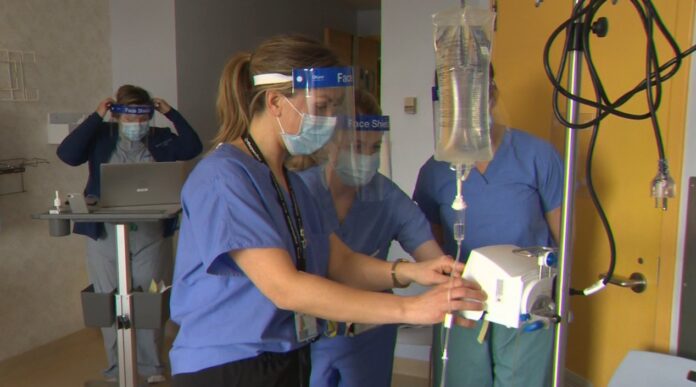At the height of the pandemic, Dr. Christy Bussey had to rent out an apartment just so she could be closer to the hospital.
“It was a very stressful time,” said Dr. Bussey, head of Halifax’s COVID-19 Inpatient Unit. “That was a very different physical strain and stress.”
The hospital became a second home for Dr. Bussey, who’s been the medical lead of the COVID-19 inpatient unit since the pandemic began. She says it’s hard to put into words how chaotic the ward got.
“We were seeing an increase in admissions very quickly, and almost an exponential rate towards the peak,” said Dr. Bussey. “We were admitting patients directly from home, via ambulances, taxi cabs, however we could get them admitted to the hospital.”
Dr. Bussey is seen in Halifax’s COVID-19 Inpatient Unit on Monday, March 14, 2022.
Graeme Benjamin/Global News
Hundreds of Nova Scotians have come and gone from the COVID-19 inpatient unit over the past two years. Dr. Bussey says as the unit got through each wave, their confidence grew and fear subsided.
“Back in wave one, wave two, we didn’t have vaccinations,” said Dr. Bussey, “so those health-care workers, physicians, allied health professionals … and our nursing staff stepped up to a challenge like no other.”
It was during the third wave of COVID-19 in April and May of 2021 when Dr. Bussey says the health-care system was nearing the brink. The province was reporting triple-digit case counts through consecutive days, with dozens being sent to hospital.
“Getting through the first wave of COVID, I think we could get through anything,” said Dr. Bussey. “It was very stressful and there were a lot of moving parts.
Trending Stories
China could aid Russia’s invasion of Ukraine. Here’s why experts say that isn’t likely
Zelenskyy says Russia wants to ‘annihilate’ Ukrainians, urges no-fly zone
“When you’re in the wave, you keep your head down and you get the work done. You’re there to do a job and you’re there to help your patient, and prioritize them. It isn’t until the wave starts to decrease that you really feel how exhausted you are physically, mentally and emotionally.”
Health-care workers in Halifax’s COVID-19 Inpatient Unit on Monday, March 14, 2022.
Graeme Benjamin/Global News
That’s a sentiment being felt by fellow health-care workers, who say many are still feeling the effects of COVID fatigue.
“The patients were getting very, very sick,” said Bev Dixon, Health Services manager of the COVID-19 unit. “They came into our unit and they may only be here for an hour and they were gone to ICU.”
“There were patients that in our eyes shouldn’t have been as sick as they were. Young patients with not too many health conditions coming in,” said Maria Collier, a Clinical Nurse Educator within Halifax’s COVID-19 unit. “There was an uncertainty. A lot of people were vaccinated, but not the whole population. It was challenging.”
Maria Collier speaks to Global News inside the COVID-19 Inpatient Unit on Monday, March 14, 2022.
Graeme Benjamin/Global News
Frontline workers say if there is yet another wave, they’re ready.
“It’s been marvelous to see how well the collaboration has been from all health-care professionals,” said Collier. “People have been put in positions they wouldn’t normally have felt comfortable with, but they just arose the occasion.”
“Yes, we’re feeling exhausted, but we don’t feel the same degree of stress or strain with each wave, because we’ve done it,” said Dr. Bussey.
Nova Scotians excited as March Break travel rebounds
© 2022 Global News, a division of Corus Entertainment Inc.



